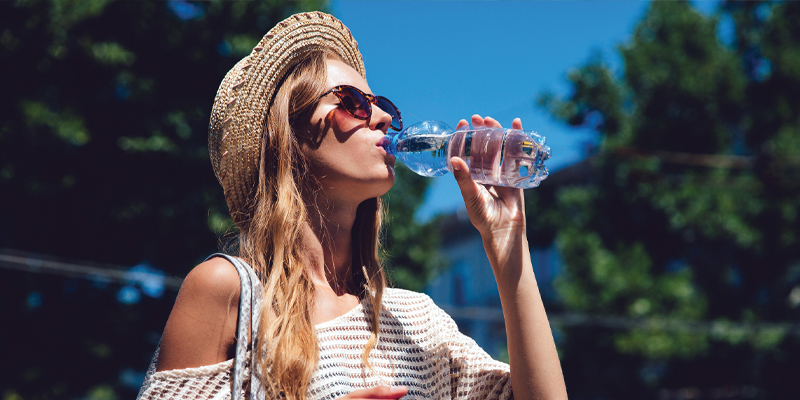Central Florida has had record high temperatures this summer, and playing in the sun can take a toll on your body. Staying hydrated is more important than ever. Your body depends on it.
Water makes up 60 percent of your body. It regulates your body temperature, flushes waste, lubricates your joints and much more. Think about it, one can survive three weeks without food but only three days without water. But, how much water should you drink every day?
Individual water needs depend on many factors, including your health, lifestyle and where you live. In the hot Florida sun, the more water you drink, the better. UCF Health experts suggest drinking at least 12 to 15 glasses of water a day during the hot summer months, especially if you are very active and frequently outside.
If staying hydrated is difficult for you, set drinking goals and keep a reusable water bottle with you to refill throughout the day. When you’re feeling hungry at work, drink water. Thirst is often confused with hunger, and drinking water when you start work makes it easier to stay hydrated throughout the day. For those who just don’t like plain water, try infusing lemons, cucumbers, oranges or other fruits for a fresh taste. Research has shown that cucumber water not only keeps you hydrated, but also delivers antioxidants and vitamins such as C and K.
While drinking water is extremely important, especially during this time of year, you can also consume water from food. A person who incorporates water-rich foods, such as watermelon, tomatoes and soup broths, in their diet may not need to drink as much water as someone who has been eating grains and other dry foods. Try to stay away from salty foods like chips and other dry, packaged snacks, which can make you dehydrated.
Some signs of dehydration include lack of energy, headache, heat stroke, dizziness and extreme thirst. A person may also go into shock and become unresponsive if not treated quickly. Some people are at higher risks of dehydration, including people who exercise in high intensity, have medical conditions like kidney stones, or are of older age. As you get older, your brain many not be able to sense dehydration and send thirst signals. A quick way to know if you are dehydrated is to do a urine color test. The darker the urine, the more water intake you need.
Staying hydrated is important during these hot summer days. Keep your family, friends and loved ones safe and healthy by being aware of dehydration symptoms, avoiding energy drinks and dry snacks, and grabbing a glass of cold water wherever you go.






Comments